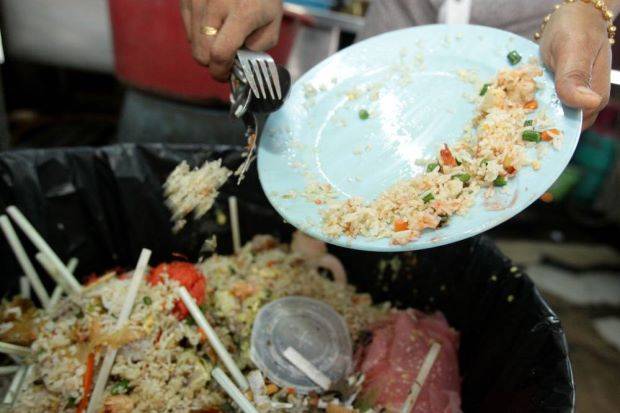Every year, as the crescent moon signals the arrival of Ramadan, cities across West Asia light up. Families gather around lavish iftar tables; mosques swell with worshippers; supermarkets overflow with people preparing for nights of shared meals and abundance. But behind the spiritual glow of Ramadan lies an increasingly visible paradox: a dramatic surge in food waste. In countries where food imports dominate, where fresh water is scarce, and where economic instability is growing, this trend is not just unsustainable, it is dangerous.
As researchers contributing to the United Nations Environment Programme’s report on the State of Food Waste in West Asia, we discovered a recurring and unsettling pattern: in countries such as Saudi Arabia, the UAE, Lebanon, and Jordan, as much as 25–50% of food prepared during Ramadan ends up in the bin. The abundance on our tables contrasts sharply with the emptiness of our food, environmental, and economic security.
Ramadan: A Time of Reflection, or Excess?
On paper, Ramadan encourages self-restraint, empathy for the poor, and minimalism. Yet, in practice, it has become a time of overconsumption. Supermarkets report record-breaking sales. Restaurants offer extravagant all-you-can-eat buffets. Social expectations dictate generosity measured not by love, but by the number of dishes on the table.
One Lebanese woman we interviewed described preparing five full meals each evening during Ramadan, “just in case guests come by.” Most nights, she admitted, half the food went uneaten. She did not feel proud, just caught in a cycle of cultural expectation. Multiply this across millions of households, and the numbers become staggering. Not just in Lebanon, but across the Gulf, Levant, and beyond.
What are the implications for food security when significant quantities of food are purchased, prepared, and plated, yet never consumed?

Source: EcoMena
The Hidden Costs of Abundance
Food waste in this context is not just an aesthetic or moral issue. It carries an enormous environmental and resource footprint. Each discarded plate represents wasted water, land, fuel, and labor.
Consider this: the region already faces severe water scarcity. Many West Asian countries rely heavily on desalination, an energy-intensive and costly process, just to meet daily household water demands. When food is wasted, all the embedded water, used to grow, process, and transport it, is wasted too.
Consider this: the region already faces severe water scarcity. Many West Asian countries rely heavily on desalination, an energy-intensive and costly process, just to meet daily household water demands. When food is wasted, all the embedded water, used to grow, process, and transport it, is wasted too. According to the Water Footprint Network, a single kilogram of beef can require up to 15,000 liters of water. Throwing it out is not just wasteful, it is reckless.
Meanwhile, greenhouse gas emissions from decomposing food in landfills contribute to climate change, further destabilizing the environmental conditions that underpin food production in the first place. UNEP estimates that food waste globally accounts for 8–10% of greenhouse gas emissions. In West Asia, where landfill remains the dominant method of disposal, this burden is magnified.
A Security Crisis in Disguise
Most West Asian countries import more than 80% of their food not simply because of geography or climate, but as a result of political and economic structures shaped over decades. Colonial powers reoriented agriculture away from diverse, local food systems toward export crops and dependency on global markets, eroding food sovereignty. Later, Western-led structural adjustment programmes deepened this reliance by cutting agricultural subsidies, liberalizing trade, and privileging imports, often of subsidized food from abroad, over investment in local production. Combined with rapid urbanization, oil-dependent economies, and chronic underinvestment in rural development, these policies entrenched a system where dependence on foreign food became the norm. While environmental challenges such as water scarcity and limited arable land are real, they were compounded by this history of external influence and neoliberal restructuring, leaving the region vulnerable to global shocks and price volatility.
Colonial powers reoriented agriculture away from diverse, local food systems toward export crops and dependency on global markets, eroding food sovereignty.
This dependence makes the region vulnerable to external shocks: war in Ukraine, global supply chain disruptions, rising grain prices. When food is thrown away in such a fragile system, the implications are grave.
It undermines economic security, especially for low-income households who cannot afford to waste. It strains social cohesion, when lavish wastefulness coexists with hunger in refugee camps and marginalized communities. And it chips away at ecological security, exhausting the very resources, soil, water, biodiversity, on which future generations will depend.
The deeper tragedy is that this crisis remains largely invisible. Few countries track household-level food waste systematically. With the exception of Saudi Arabia and the UAE, national data is patchy, and measurement is not standardized. Without reliable figures, it is difficult to design effective interventions.
Seeds of Change
But there is hope. Across the region, small initiatives are sprouting like seeds in dry soil.
In Beirut, Chef Leyla Fathallah uses her TV platform to educate viewers on creative ways to repurpose leftovers. During Ramadan, she encourages families to plan meals carefully, cook in smaller quantities, and freeze what they don’t eat.
In the UAE, campaigns like “Sustainable Ramadan” partner with religious leaders to reframe conservation as a spiritual act. Mosques now host community iftars designed around zero-waste principles. Some hotels even redistribute leftovers to food banks or compost them for community gardens.
In Saudi Arabia, the government has launched a national food loss and waste baseline and is piloting incentives for businesses that donate surplus food. Cold chain infrastructure is expanding, allowing perishable items to be transported and stored more efficiently.
Still, these efforts remain islands of innovation in a sea of inertia. They must be scaled, and fast.
Reframing Security: Beyond Borders and Budgets
When we think of security in West Asia, we often picture border disputes, oil pipelines, or geopolitical alliances. But the security threats of the future may look very different. They may come in the form of climate-induced crop failures, inaccessible food imports, or public health crises linked to poor nutrition.
Food waste is not a side issue. It is a lens through which we see the fragility of our systems, and an opportunity to make them stronger.
Reducing waste during Ramadan, or any time of year, is not just about saving money or being polite. It is about building resilience: in our ecosystems, our economies, and our communities. It is about securing the right to food not just for ourselves, but for the people we will never meet, those living downstream, in refugee camps, or in the next generation.
Toward a Culture of Conservation
If food is life, then wasting food is, in some sense, wasting life. Yet, habits can change. Cultural norms evolve. What once was a show of generosity can become a show of responsibility.
Perhaps the greatest security we can offer is not a stockpile of food, but a shift in mindset, a regional awakening that sees waste not as a luxury we can afford, but a threat we can no longer ignore.
The future of West Asia’s food systems will not be written only in policy documents or technical reports. It will be written around kitchen tables, at hotel buffets, in grocery aisles, and at iftar gatherings. It will depend not just on what we eat, but on what we choose not to waste.
